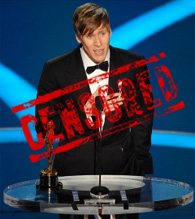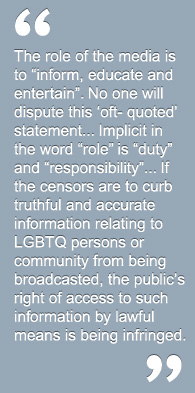George Hwang and Tan Tarn How, a senior research fellow at the Institute of Policy Studies (Singapore), will discuss issues concerning the censorship of homosexuals, within and without the arts, at a forum Censorship: Homosexual Lifestyle and Freedom of Expression at 7.30pm on Friday, Aug 28 at Post-Museum, 107+109 Rowell Road. For more information, visit www.plu.sg/indignation.
When one talks about censorship of contents in the media, the discussion usually centres on the right to freedom of expression by the media players, be it for news or in the arts. Freedom of expression is not just a one sided street, where the media players impart their opinions, values and ideas. It encompasses the converse, the right of the public to receive information. Therefore, by censoring homosexual contents indiscriminately, the authorities have breached or infringed the rights of the media and the public.

Viewers in Singapore who watched the repeat telecast on free-to-air Channel 5 reported that entire chunks from Dustin Lance Black's (above) and Sean Penn's speeches referencing the former's experiences about growing up as a gay young man and gay marriage rights respectively were cut.
The role of the media is to “inform, educate and entertain”. No one will dispute this ‘oft- quoted’ statement. Has this role of the media been fulfilled as far as content relating to LGBTQ is concerned? You will agree with the answer, “No”.
Implicit in the word “role” is “duty” and “responsibility”. If the media has a duty, the public has a right, the right to know.
The correlation between freedom of expression and right to information has been enshrined in many human rights treaties. They include the International Covenant on Civil and Political Rights and the European Convention for Human Rights.
Article 19(2) of the International Covenant on Civil and Political Rights states:
“Everyone shall have the right to freedom of expression; this right shall include freedom to seek, receive and impart information and ideas of all kinds, regardless of frontiers, either orally, in writing or in print, in the form of art, or through any other media of his choice.”
Article 10 of the European Convention on Human Rights states:
“Everyone has the right to freedom of expression. This right shall include freedom to hold opinions and to receive and impart information and ideas without interference by public authority and regardless of frontiers.”
Since free TV reaches out to both educated and less fortunate illiterate Singaporeans, it covers the broadest spectrum of our society. We shall concentrate on this medium.
Doubtless the duty to inform and educate is more important than to entertain. This is clear in broadcasting, where the Authority can impose a condition in its licence so that broadcasters have to broadcast certain required programmes. Has the duty to inform and educate the public on gay, lesbian, bisexual, transvestites, transsexuals and other sexual minorities been fulfilled? If it is “no”, the public’s right has been infringed.
So far, only the “entertainment” limb seems to be fulfilled. How many films or dramas have we watched where the serial killers are maladjusted transsexuals or where the gay characters are limp-wristed hairstylists? How many programmes which depicts LGBTQ people you and I, your neighbours, your colleague at work; have been aired in Singapore?
Popular US sitcom Will & Grace, which features a gay male lawyer and his straight female best friend and has earned 16 Emmy Awards and 83 nominations in its eight-year run (1998 to 2006), is notably not seen on TV (whether free to air or cable) in Singapore.

If the censors are to curb truthful and accurate information relating to LGBTQ persons or community from being broadcasted, the public’s right of access to such information by lawful means is being infringed.
Two recent events support the view that our rights as the members of the public have been infringed. One by the authorities, the other by the media when self-censorship is exercised.
It is not difficult to recall MediaCorp being fined S$15,000 (US$10,000) last year for airing an interior design programme with an episode featuring the makeover of a room into a nursery for the adopted baby of a same-sex couple. The Media Development Authority (MDA) issued a press statement saying: "This is in breach of the Free-to-Air TV Programme Code which disallows programmes that promote, justify or glamourise gay lifestyles... MDA also consulted the Programme Advisory Committee for English Programmes (PACE) and the Committee was also of the view that a gay relationship should not be presented as an acceptable family unit."
The same week a 3-minute segment of the Ellen DeGeneres Show where the openly lesbian host condemned homophobia and spoke about the fatal shooting of a 15-year-old gay student Lawrence "Larry" King in school was censored on MediaCorp's Channel 5. Her remarks were in response to an American (Oklahoma) state legislator Sally Kern's anti-gay remarks in a speech addressing her fellow Republican colleagues in which she said that "the homosexual agenda" poses a bigger threat to the United States than terrorism.
It is even easier to remember the snipping of the acceptance speeches by Sean Penn and Dustin Lance Black at this year’s Oscars for Best Actor and Best Adapted Screenplay respectively for the movie Milk by the broadcast station itself. The latter is, no doubt, out of fear. (A list of other fines and examples of censorship in Singapore are linked at the end of the article.)
Should this state of affairs continue? More importantly, should the public’s right be reinstated?
The Free-To-Air Television Programme Code guidelines on morality states:
“Information, themes or subplots on lifestyles such as homosexuality, lesbianism, bisexualism, transexualism, tranvestism, paedophilia and incest should be treated with utmost caution. Their treatment should not in any way promote, justify or glamorize such lifestyles. Explicit depictions of the above should not be broadcasted.”
I will leave you to decide whether the two censored programmes are more a ‘documentary’ than a “promotion of homosexual lifestyle”.
One depicts the home of a couple in a country where same sex marriage is legal. Their home is one of the many homes chosen for its interior decoration. The others belong to different-sex couples. It is shown like the homes of the different-sex couples. No special treatment was given to it. This is how some people live in Canada. This is factual information not drama.
The other is a piece of “news” on an event of an industry. The awards are two of the highlights of the evening. Who the winners for the Best Actor award and Best Adapted Screenplay are will be reported all over the world. This is a piece of news. This is factual information. It could be entertainment news but it is not entertainment itself. I wonder if this “news” can ever not be reported or not have people finding out, in Singapore.
Anyone accusing the award as glamorising “homosexual lifestyle” needs to watch the film Milk. Hollywood may be glamourous, film making is not. Even less is the life of Harvey Milk and the way it was depicted.
The government will be appointing a Censorship Review Committee later this year to study and recommend policies on content regulation. The Censorship Review Committee Report 2003 states that ours is a heterogenous society. It recommended liberalisation on contents relating to homosexuality though it should not be construed as official endorsement of such “lifestyle”. The new committee should examine if there has, in fact, been any liberalisation of policy in this area. Further, it ought to be aware that where states try to promote information that is one-sided, it is tantamount to indoctrination. Such actions have been interpreted in the human rights world as infringement of the right to hold opinions, again part of the right to freedom of expression. States need to be impartial and neutral. It should promote a plurality of voices in the media. These are concepts that the many seems to grasp but failed to implement.
If the media is too meek to uphold its rights, we should remember as members of the public, we have a right to truthful and accurate information. As for the mechanism for complaints and whether there is such a thing as “homosexual lifestyle”, we will leave them for another day, another time.
George Hwang is a lawyer and is on the Steering Committee of Oxford (UK)-based International Media Lawyers Association.
George Hwang and Tan Tarn How, a senior research fellow at the Institute of Policy Studies (Singapore), will discuss issues concerning the censorship of homosexuals, within and without the arts, at a forum Censorship: Homosexual Lifestyle and Freedom of Expression at 7.30pm on Friday, Aug 28 at Post-Museum, 107+109 Rowell Road. For more information, visit www.plu.sg/indignation.
